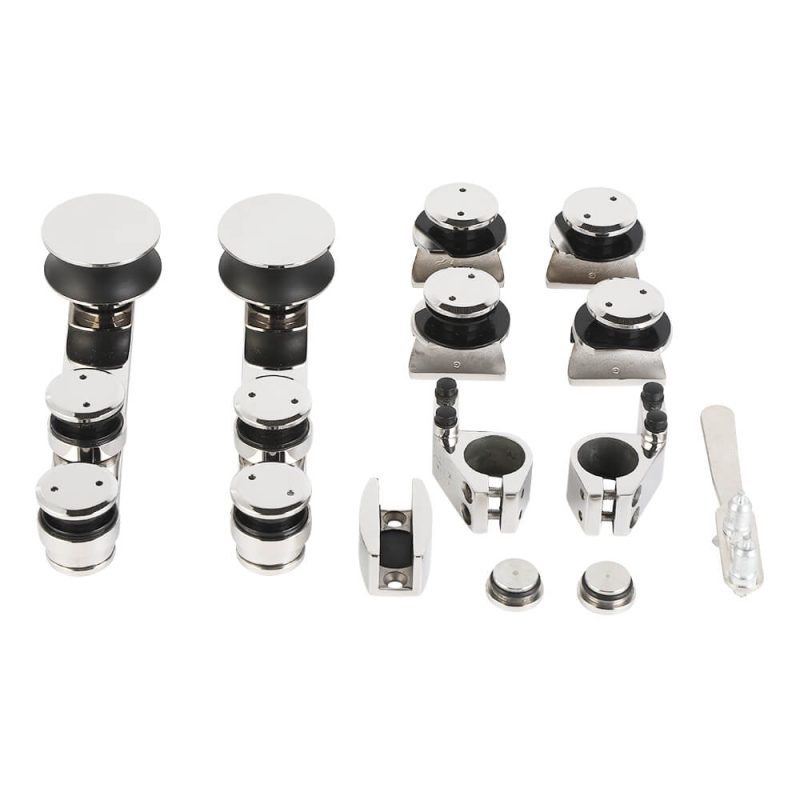Environmental Considerations- Sustainable Materials in Shower Door Clip Production
Introduction
Shower door clips, small yet essential components, play a crucial role in securing glass shower doors and ensuring a smooth and safe showering experience. However, the production of these clips often involves the use of non-sustainable materials and processes that can harm the environment. This article explores the environmental implications of shower door clip production and proposes sustainable alternatives that can mitigate these impacts.
Materials Utilization
Traditionally, shower door clips have been made from non-biodegradable materials such as plastic, which takes centuries to decompose and contributes to landfill waste. To address this issue, manufacturers are increasingly turning to eco-friendly materials such as recycled aluminum and stainless steel. These materials can be reused or recycled at the end of their lifespan, reducing the environmental footprint of clip production.
Energy Consumption
The manufacturing process of shower door clips also consumes a significant amount of energy. Casting and molding techniques, which are commonly used to produce clips, require high temperatures and specialized equipment. By optimizing production methods and utilizing energy-efficient technologies, manufacturers can reduce the carbon footprint associated with clip production.
Water Usage
Another environmental concern is the use of water in clip manufacturing. Water is utilized for cooling and cleaning processes, as well as for the production of auxiliary materials such as lubricants. To mitigate water consumption, manufacturers can implement water-saving measures such as closed-loop systems and efficient water treatment technologies.
Toxin Emissions
Shower door clips may contain traces of harmful chemicals or toxins that can be released into the environment during production. These chemicals, if not properly controlled, can contaminate water bodies and pose health risks to workers and the surrounding community. By employing non-toxic materials and implementing stringent emission controls, manufacturers can reduce the environmental impact of clip production.
Waste Generation
The production of shower door clips inevitably generates waste materials, including scraps, packaging, and process byproducts. To minimize waste, manufacturers can adopt lean manufacturing practices, reducing material usage and optimizing production processes. Furthermore, they can establish recycling programs to divert waste from landfills and promote resource recovery.
Sustainability Certification
Third-party sustainability certifications, such as the GreenGuard certification, provide independent verification of the environmental performance of shower door clips. These certifications assess product life cycle, material sourcing, indoor air quality, and environmental impacts, ensuring that clips meet industry-recognized sustainability standards.
Conclusion
Sustainable materials, energy efficiency, responsible water usage, toxin reduction, waste minimization, and sustainability certification are all crucial considerations in the production of shower door clips. By adopting these practices, manufacturers can mitigate the environmental impact of their operations while meeting the growing demand for eco-friendly building products. Consumers can play a vital role by choosing clips made from sustainable materials and supporting manufacturers that prioritize environmental stewardship.
-
What is the maximum weight that frameless shower door clips can support?
11-12-2025 -
Shower Glass Clips Hardware: The Ultimate Guide to Choosing, Installing, and Maintaining
05-12-2025 -
What Are the Different Types of Shower Screen Glass Clamps and How to Choose?
26-11-2025 -
Clip-On Shower Door vs. Traditional Hinges: Which Is Better?
21-11-2025 -
Stainless Steel vs. Brass: The Best Choice for Your Shower Door Clips
19-11-2025
-
How to choose the right size of clamps for shower glass panels?
11-12-2025 -
How to choose shower glass panel clamps for frameless shower enclosures?
10-12-2025 -
Which material is best for shower door clamp hinges in wet environments?
08-12-2025 -
What Does the Lock Retainer Clip Do in a Glass Office Door Mechanism?
04-12-2025 -
What are the standard dimensions and material specs for door handle linkage clips used in frameless glass doors?
03-12-2025











